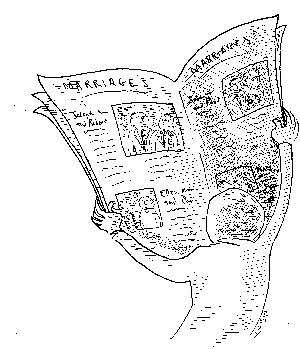|
Issue Date: August 29, 2003
Outlaw tradition fades with gains toward acceptance By SANDIP ROY The Dallas Morning News has just announced that it will list same-sex unions in its pages. “That’s The Dallas Morning News,” my friend pointed out. “That’s different from The New York Times.” With the Supreme Court’s verdict on the Texas sodomy case and gay marriage across the border in Canada, it seems all we need are gays in the military and the activists can all go home. In a way, it’s what I dreamed of growing up in India, where gay sex is still illegal. I dreamed of a place where it wouldn’t be a big deal to be gay -- and now here I am. The Supreme Court is OK with it. The Dallas Morning News is OK with it. Maybe we will even have some kind of gay marriage in Massachusetts. Activists on both sides of the debate, major periodicals are all speculating that the Supreme Court decision has opened the gates to the ultimate gay Shangri La: marriage. But some gay men are not so sure that’s what they are looking for. “I have no particular ambition to mimic my brother’s marriage, with a ceremony in a bad hotel with poached salmon,” said Richard Rodriguez. The author of books such as Days of Obligation and Brown, which won the 2003 California Book Award, Rodriguez once wrote about the irony of gay men gentrifying San Francisco by converting and redecorating rows of old Victorians. After all, Victorians were the ultimate symbols of strait-laced family life. At that time, Rodriguez had written, “In these same Victorian homes, homosexuals were leading rebellious lives to challenge the foundations of domesticity.” But in the end, perhaps the Victorians had the last laugh as they domesticated the gays. Traditionally gays were the outcasts, the outsiders. “Centuries of being an outlaw did teach us other ways of imagining society,” Rodriguez said. “Knowing you did not belong was sometimes an asset for young men growing up in desperate towns where you got married at 17 and where your horizon was otherwise limited to the local plant where your father and grandfather worked.” As I watched crowds in San Francisco’s Castro, the city’s famously gay neighborhood, down half-price cocktails to celebrate “the Supremes” I couldn’t help wondering what happens to gay rebellion when there is nothing to rebel against? So much of being gay has been about all the things I couldn’t have that my sister took for granted -- the wedding sari, the kids, my brother-in-law’s place in the family album. Can I face getting what I thought I always wanted? Am I ready to be a soccer mom? It’s a bittersweet victory, this laying claim to being ordinary, to being “normal.” I remember as a young man coming out in India, I longed for my own apartment that I could just bring a lover home to. I dreamed of a gay bar where I could meet men like me without cruising in shadowy parks while cops prowled. I have all that now. Yet every now and then in the midst of the non-stop party whirl of gay life in San Francisco, where shirtless men dance in large warehouses with fog machines, where the mayor shows up at a street fair for leather men, gay life can feel almost too legitimate. Sometimes I get the oddest hankering for the fillip of danger that went with being gay, when it was still forbidden fruit. Every year it seems the gay community is up in arms about one issue or the other -- the right to serve in the military, the right to visit our partners in the hospital, the right to get married. These fights appear discrete, but their common thread is a much more basic yearning that exists outside the ambit of legislative change -- the need for society to acknowledge that we are not perverse. Rodriguez sees the Supreme Court less as making history than acknowledging a reality on the ground. When the vice president’s daughter does not deny she is a lesbian, it means “the issue of whether or not we can join the American family is following the fact that we already are part of that family.” Being gay is no longer the shadowy preserve of the night. The love that once dared not speak its name is part of daytime talk shows, Republican conventions and softball leagues. Rodriguez thinks our outlaw tradition might survive our newfound legal status. “We are using the words privacy, sodomy, even marriage in this debate. But no one wants to use the word that gets to the central issue -- love.” According to him, it’s not sex or even marriage with its poached salmon that we are really after. “Society might give us the right to sex in private. But when the pope gives me the word ‘love,’ then I’ll break out the bottle of champagne.” Pacific News Service associate editor Sandip Roy is host of “Upfront,” a weekly radio program on KALW-FM, San Francisco. National Catholic Reporter, August 29, 2003 |
 Bittersweet victory for gays
Bittersweet victory for gays